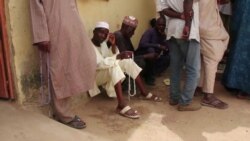When the northeastern Nigeria town of Damboa came underattack by Boko Haram militants last year, thousands fled, seeking refuge in makeshift camps scattered through the region or, if lucky, relatives.
Bazam Ali was one of those who sought haven in Gombe, some 150 miles to the southwest. He wants to go back home, but said he has nothing to return to.
"We don’t have anything in Damboa. Everything has been burned. And we don’t have any means to make us to stay there,” he said.
Tens of millions of Nigerians will cast ballots on March 28 in what is turning into the most critical election the West African nation has held in more than a decade.
Incumbent Goodluck Jonathan is trying to win another four-year term, but his handling of the nearly six-year insurgency by Boko Haram has stoked voter discontent. Former military ruler Muhammadu Buhari now has the best odds at winning since the return of democracy in 1999.
Officials have promised to ensure the election is free and transparent, and have rolled out an extensive system of “personal voter cards” and electronic card readers to make sure the vote is fair.
But how the estimated 1 million people displaced by Boko Haram, particularly in the war-torn northeast, will vote is an open question.
Dr. Arap Rukuje, the executive secretary of Gombe’s State Emergency Management Agency, said people who have been forced to flee — also known as “internally displaced people"— are caught in the middle.
They can’t vote in Gombe, he said, because they aren’t registered there, and where they are registered has suffered under Boko Haram occupation.
“There are a few of them who say, 'I am not going back again, this is now my town.' There is very little you can do. They are not registered here, I don’t know what the responsible agency will do,” Rukuje said. “But those ones that will need to go back to Damboa, the challenges will be, maybe they’ll go back to Damboa and they don’t have a house. Because it’s been burned down, or it’s been pulled down.”
In addition to those Nigerians who have fled their homes to other states, more than 150,000 have fled across the border to Cameroon, Chad and Niger.
Mohammed Ali, who leads a group of 2,000 displaced people from Damboa, said many want to vote, but many don’t have the money to travel to the places where they are registered.
"We have the intention of going to Damboa to cast our votes, but first of all, we want the governor to assist us with a vehicles to convey us to Damboa to cast our votes,” Ali said. “And if the vehicles are not available, let them send us money to give us money to cast our votes."
The fate of displaced voters not being able to cast ballots could have an impact on Buhari’s final vote tally, since the former military ruler’s strongest support comes in Nigeria’s northern states. In 2011, he garnered 77 percent of the vote in Borno State.
In cooperation with troops from neighboring countries, and a number of foreign mercenaries, Nigeria’s military has retaken many of the towns the insurgents had captured over the past 18 months. But those who return often find their towns are little more than rubble and ash.
Analysts expect militants to continue attacking across the northeast for months or even years to come. That could make voting a risky prospect even for those who return.












